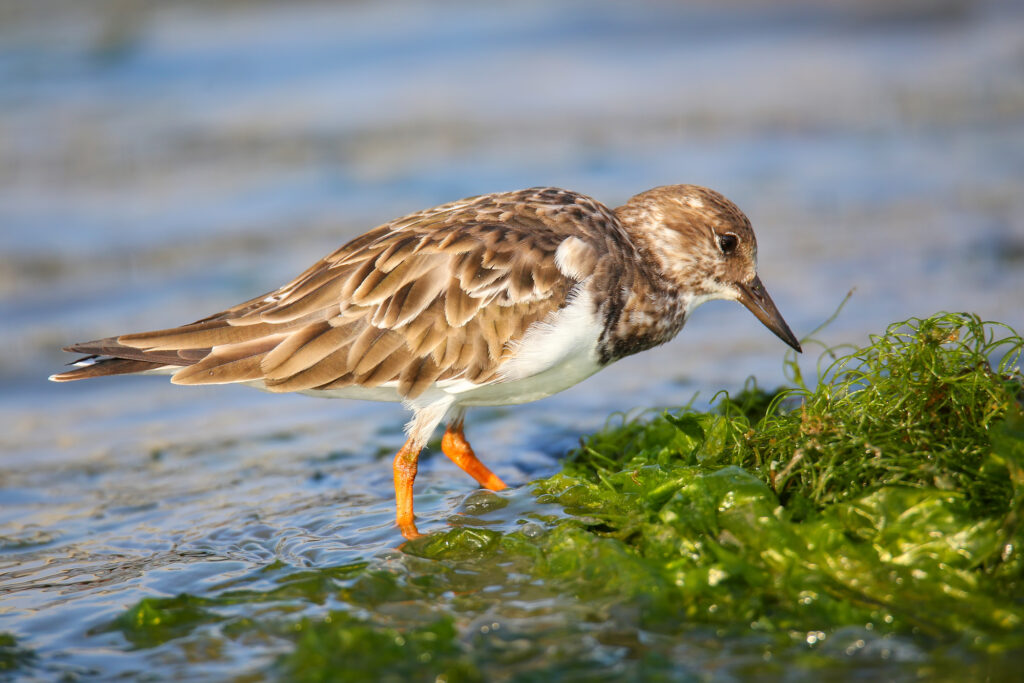Do birds eat seaweed? Short answer? Yes! Birds can eat seaweed, which is a blanket term for a group of “marine plants and algae,” according to the National Ocean Service.
Lauded for its medicinal, holistic, and dietary uses (sushi anyone?), seaweed has many benefits for both humans and birds.
This doesn’t mean it’s without its risks, which we’ll cover more down below.
Back to the birds! Some wild birds do eat seaweed, but many prefer to eat other things, such as insects or seeds. The main birds who partake are omnivores or herbivores who live along shorelines or bodies of water where seaweed is present. And while you can feed your pets processed seaweed, it usually contains extra salt and additives which may not be conducive to a healthy diet, long term.
If you are curious about whether or not your favorite bird eats seaweed, along with the risks and possible benefits, keep reading to learn more!
Why Birds Eat Seaweed
Some birds, such as hawks, are carnivores, who only feast on the meat of other animals. Meanwhile, some birds are herbivores, which means their diet consists of plants and other organic matter. Birds who eat seaweed usually fall into the latter category, or at the very least they’re omnivores (animals + plants).
Birds that live near the shore often eat seaweed because it’s a plentiful, nutritious food source. Seaweeds are a type of algae that grow in the ocean and some other bodies of water, such as lakes and ponds. They can be very long, and they are usually green or red.
In addition to providing nutrients and vitamins, seaweeds also help birds to stay hydrated..
What Kind of Birds Eat Seaweed?
Seaweeds are an important food source for many different kinds of birds. Gulls, terns, and other seabirds often eat seaweeds as part of their diet. Some land birds also eat seaweeds that have been washed up on shore.
In addition, many waterbirds eat seaweeds that grow in shallow waters. Herons, egrets, and ibises are just a few of the many kinds of birds that eat seaweeds.
While some birds eat seaweeds because they are attracted to the taste, others eat them for the nutrients they contain. Seaweeds are a good source of vitamins and minerals, and they can help birds stay healthy and strong. So next time you see a bird eating seaweed, remember that it’s not just for fun – it’s for dinner!
Is Seaweed Poisonous to Animals?
Seaweed is a type of algae that grows in saltwater. It’s an important food source for marine animals, and humans have also used it as food and medicine for centuries. Seaweed is low in calories and fat but high in vitamins, minerals, and fiber. It can be eaten fresh, dried, or cooked.
Some animals are known to be poisoned by seaweed, but the jury is still out on whether or not it is harmful to humans. Some studies have shown that seaweed can accumulate toxins from the environment, including mercury, lead, and cadmium. And there have been reports of birds dying after ingesting seaweed.
These toxins can potentially cause health problems in people who eat large amounts of seaweed. Seaweed can also contain naturally-occurring toxins that can cause gastrointestinal distress in people and animals.
For these reasons, it’s important to exercise caution when eating seaweed or feeding it to animals. If you’re unsure about whether or not a particular type of seaweed is safe to eat, it’s best to err on the side of caution and avoid it altogether.
Do Birds Eat Kelp?
Kelp is a type of seaweed that is often used in Asian cuisine. It is also a popular ingredient in many health supplements and cosmetics.
Kelp grows in cold, shallow waters and can reach up to 100 feet in length. Despite its size, kelp is a very delicate plant.
Kelp is an important food source for many animals, including fish, crabs, and sea urchins. However, birds are not typically known to eat kelp. There are a few records of seabirds eating kelp, but these instances are rare and it is not known if the birds actually digest the kelp or if they just use it to line their nests.
Generally, birds prefer to eat small insects and other invertebrates. So, while birds may occasionally nibble on kelp, it is not a major part of their diet.
Is Kelp Good for Birds?
As you probably know, kelp is a type of seaweed that grows in shallow, saltwater habitats. It’s an important part of the marine ecosystem, providing food and shelter for a wide variety of creatures.
But what you may not know is that kelp is also an important food source for many species of birds. Some birds, such as the California clapper rail, depend almost entirely on kelp for their survival.
Kelp is rich in nutrients and provides an excellent source of energy for birds. It’s also relatively easy to digest, which is important for birds that need to fly long distances. In addition, kelp forests protect from predators and the elements. For these reasons, kelp is an important part of the diet of many birds.
So, is kelp good for birds? Absolutely! Kelp provides essential nutrients and energy, and it also helps to protect birds from predators and the elements. If you’re looking for a way to help bird populations thrive, consider adding kelp to your list of bird-friendly foods.
Conclusion
Seaweed is a type of algae that grows in saltwater. It’s an important food source for marine animals, and humans have also used it as food and medicine for centuries, due to its low fat and high vitamins, minerals, and fiber content. Despite seaweed’s many benefits, it can pose risks, if consumed in high quantities.
Therefore, you should always consult with your veterinarian before you feed it to your domestic bird.

